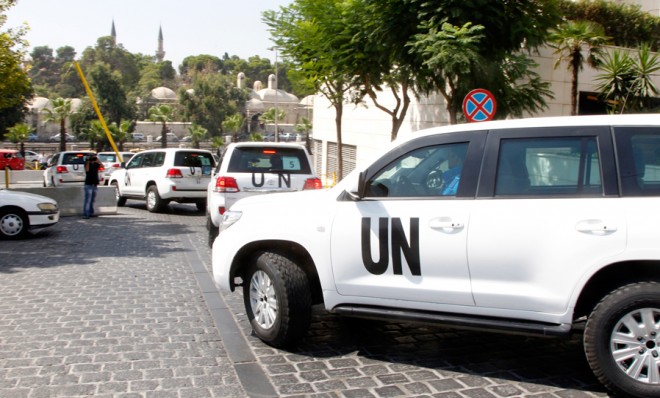Is Western intervention in Syria inevitable?
Bashar al-Assad's apparent use of chemical weapons may have left the world no choice


A free daily email with the biggest news stories of the day – and the best features from TheWeek.com
You are now subscribed
Your newsletter sign-up was successful
Earlier today, United Nations weapons inspectors finally reached the scene of last week's alleged poison-gas massacre in Syria, after their convoy was delayed by sniper fire. The U.S. and U.K. have threatened a "serious response" if the inspection supports opposition activists' claim that the deadly gas attack was carried out by the Syrian military.
Syrian President Bashar al-Assad swears that his troops did not carry out the attack. An Obama administration official, however, said there was "little doubt that these attacks were undertaken by the regime." And U.S. officials said the Assad government's decision to allow inspectors access to the site after five days of evidence-destroying bombing was "too late to be credible."
The White House says President Obama has not decided yet how to respond, but a consensus is building among many analysts that some kind of military response by the U.S. and its allies is now inevitable, particularly after Obama warned Assad last year that the use of chemical weapons was a "red line" that could not be crossed without consequences.
The Week
Escape your echo chamber. Get the facts behind the news, plus analysis from multiple perspectives.

Sign up for The Week's Free Newsletters
From our morning news briefing to a weekly Good News Newsletter, get the best of The Week delivered directly to your inbox.
From our morning news briefing to a weekly Good News Newsletter, get the best of The Week delivered directly to your inbox.
Assad, in an interview with the Russian newspaper Isvestia, warned that any U.S. intervention would result in "failure just like in all the previous wars they waged, starting with Vietnam and up to the present day." Obama has openly stated that he wants to avoid another costly war in the region, suggesting, perhaps, that the U.S. and Britain would instead opt for hammering Assad with air strikes.
The U.S. already has ships in the eastern Mediterranean, and is sending more, as is the British Navy. Christi Parsons and Patrick J. McDonnell at the Los Angeles Times note that regardless of what the U.N. inspectors find — and experts say the evidence of nerve gas use disappears quickly — the Obama administration has condemned Syria so clearly that it would find it difficult to back down now.
The dismissal of the Syrian offer of inspections, the assertion of "little doubt" about the use of proscribed weapons and the labeling of the attack as "indiscriminate" all represented a toughening of the U.S. rhetoric. The language seemed to close off potential avenues for avoiding military action and raised the likelihood of a strike against some Syrian targets. [Los Angeles Times]
Administration officials reportedly began drawing up a list of those targets late last week. Fred Kaplan at Slate says Obama already has a blueprint for a strategy — the 1999 air war in Kosovo. In that conflict, ethnic Albanians were being massacred by Serbian President Slobodan Milosevic, and President Bill Clinton reluctantly decided to intervene. Russia, Serbia's main ally, blocked the U.N. Security Council from using force, so Clinton turned to NATO.
The parallels with Syria are obvious. In this case too, an American president, after much reluctance, seems to be considering the use of force but can't get authorization from the U.N. because of Russia's (and China's) certain veto. The pressures to act have swelled in recent days, with the growing evidence — gleaned not just from Syrian rebels but also from independent physicians' groups and U.S. intelligence — that Assad's forces have used chemical weapons, killing more than 1,000 civilians.But where can Obama turn for the legitimacy of a multinational alliance? Nobody has yet said, but a possible answer is, once again, NATO — this time led perhaps by Turkey, the alliance's easternmost member, whose leaders are very concerned by the growing death toll and instability in Syria just across their southern border. [Slate]
Does this mean that the U.S. will try to put an end to Syria's civil war, which has already dragged on for more than two years and cost tens of thousands of lives? Probably not, says Michael Crowley at TIME. But Assad has pushed the reluctant West too far, Crowley says, and after declaring the use of chemical weapons a "red line" a year ago, Obama now has no choice but to act to preserve America's credibility and reinforce the international taboo against using forbidden chemical weapons.
A free daily email with the biggest news stories of the day – and the best features from TheWeek.com
Obama could serve his two goals with limited strikes on a handful of military targets, probably by means of cruise missiles that involve no risk to U.S. personnel. The goal would be to impose a cost on Assad that outweighs whatever he thinks he gained by gassing hundreds of people near Damascus last week, as he is accused of doing. In doing so, Obama could hope to deter Assad from using his chemical arsenal again. And to demonstrate to the rest of the world, and especially to Iran, that he means what he says. Anyone hoping for more will likely be disappointed. [TIME]
Harold Maass is a contributing editor at The Week. He has been writing for The Week since the 2001 debut of the U.S. print edition and served as editor of TheWeek.com when it launched in 2008. Harold started his career as a newspaper reporter in South Florida and Haiti. He has previously worked for a variety of news outlets, including The Miami Herald, ABC News and Fox News, and for several years wrote a daily roundup of financial news for The Week and Yahoo Finance.
